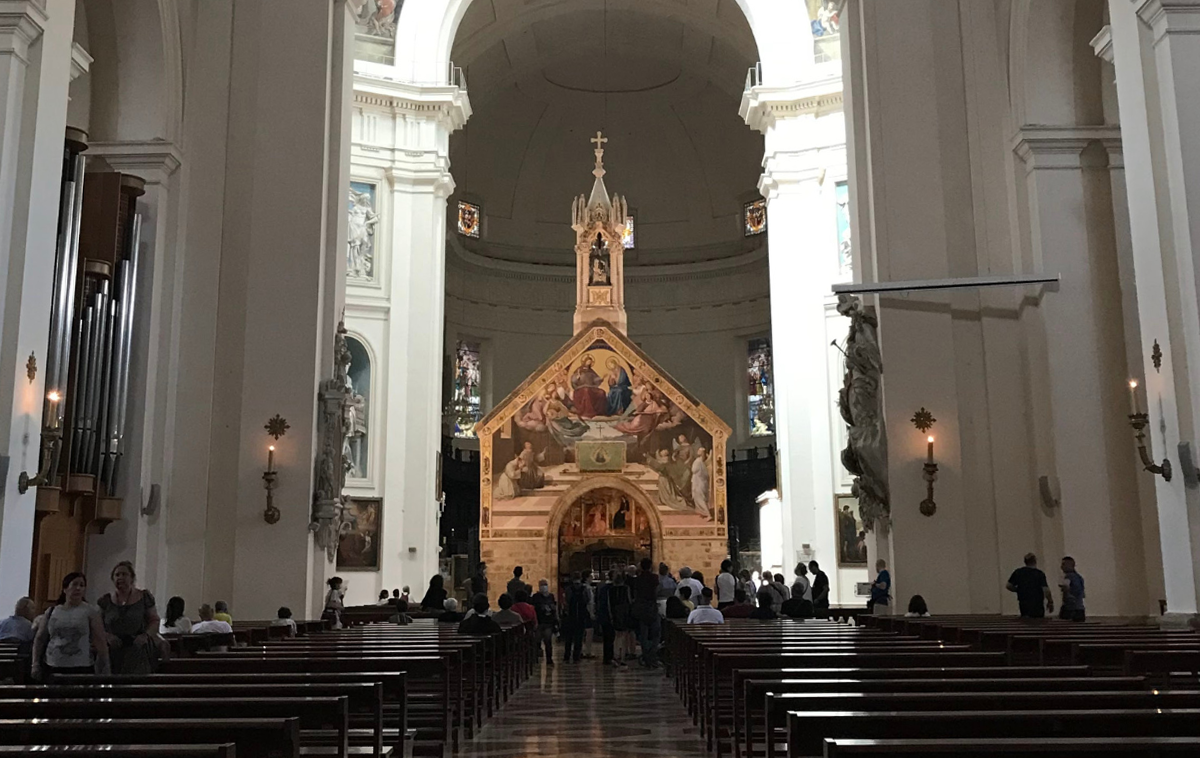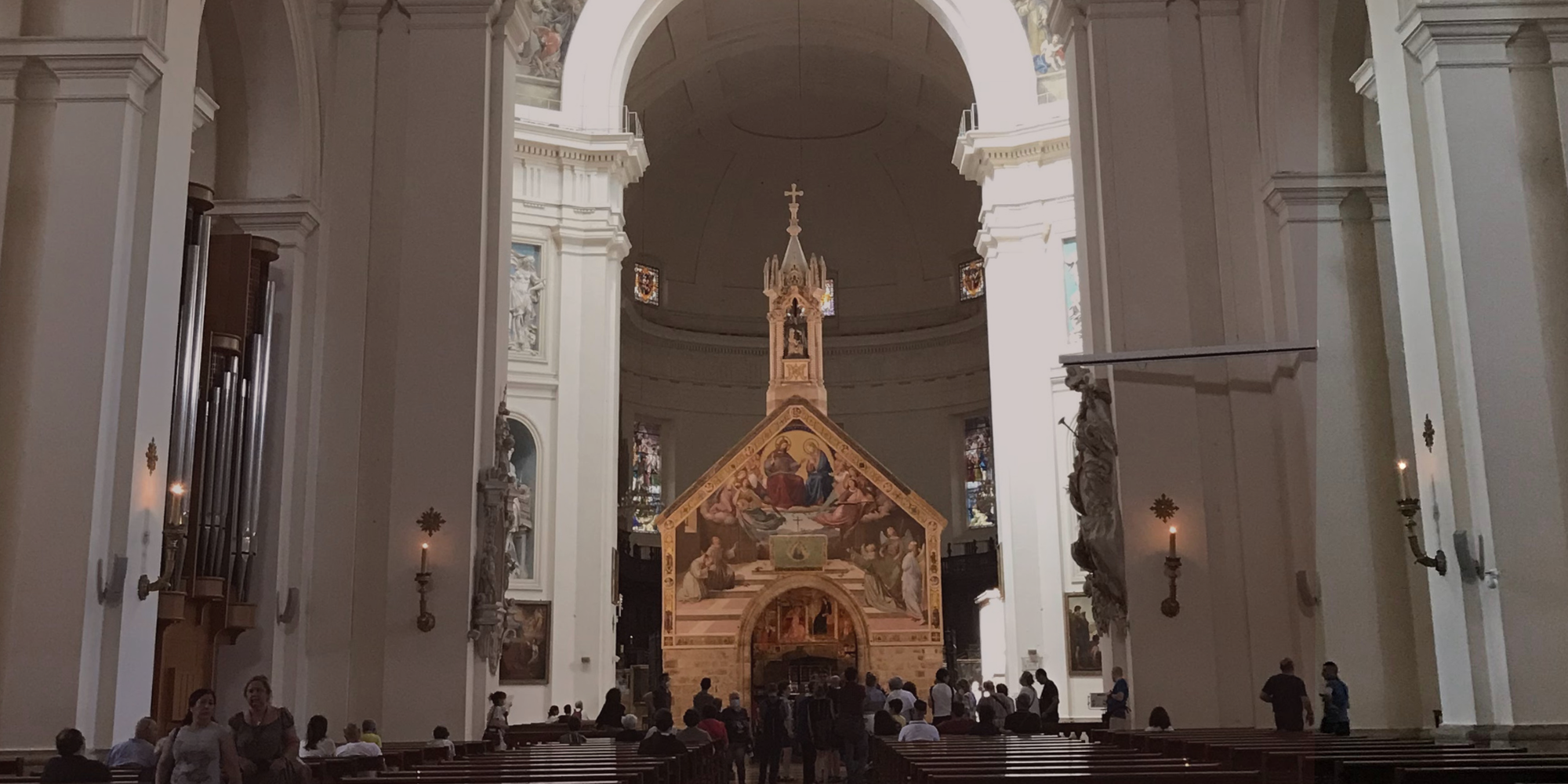What is the feast of the Portiuncula?
Date Published: August 02, 2024
By Eli Pacheco
The feast of Our Lady of the Angels of the Portiuncula is Aug. 2. On this date, Franciscans celebrate the dedication of the Chapel of St. Mary of the Angels in Assisi, the site of notable events in Franciscan history.
The Portiuncula is the birthplace of the Order of Friars Minor and the Order of St. Clare, as well as the place where St. Francis of Assisi died. The feast includes a plenary indulgence that brings thousands of pilgrims to Portiuncula each year.
What is the Portiuncula?
The Portiuncula is a small stone chapel located within the Papal Basilica of St. Mary of the Angels in the valley close to Assisi. It has been the site of notable events throughout the Franciscans’ history.
Legend has it that the chapel dates to the 300-500s. By St. Francis’s time, it had been abandoned and was in bad shape. Early in his conversion, God called Francis to “rebuild my church, which you can see is falling into ruin.”
Francis took the message literally and began restoring abandoned and crumbling churches and chapels near Assisi.
The Portiuncula, which means “little portion,” was the third building Francis restored. Named for the tiny piece of land on which it stood, this humble chapel became hallowed ground.
In about 1210, the Portiuncula became the birthplace of the Order of Friars Minor when Francis and the first brothers began living there. Two years later, St. Clare of Assisi promised her life to Jesus there, beginning the Order of St. Clare.
And, in 1226, St. Francis of Assisi died at the Portiuncula in a small cell, or room, that can still be visited today.
In the 1560s, Pope Pius X ordered the construction of a basilica to house the chapel as multitudes of pilgrims converged on the humble building each year. Construction took 10 years, beginning in 1569, and the basilica suffered damage in an 1832 earthquake.
Restorations after that disaster and additional restorations in the 1920s have kept the chapel in service since.
The Portiuncula and the basilica are open to visitors. They can be found at Piazza Porziuncola, 1 06081 Assisi PG, Italy. For more information, visit the basilica’s website.

The Portiuncula, a small medieval stone chapel, stands inside the Basilica of St. Mary of the Angels, built centuries later to preserve the chapel. (Photo courtesy of Maria Hayes)
Did you know?
... that St. Francis wanted to go to the Portiuncula when he knew his death was imminent? Br. Thomas of Celano, OFM, one of St. Francis’s contemporaries, wrote of this request:
“For he wanted to give back his soul to God in that place where ... he first came to know perfectly the way of truth. After he had rested a few days in that place he so longed for, knowing the time of his death was close at hand, he called to him two brothers, his special sons, and told them to sing The Praises of the Lord with a loud voice and joyful spirit, rejoicing at his approach to death, or rather at the life that was so near.”
The Pardon of Assisi (Portiuncula indulgence)
Thousands make the pilgrimage to the Portiuncula on Aug. 2 to receive a plenary indulgence for repenting their sins, known locally as the Pardon of Assisi.
St. Francis wanted everyone to experience God’s overwhelming love and mercy, just as he had at the Portiuncula. He convinced Pope Honorius III to grant the indulgence to visitors seeking absolution.
Legend says that St. Francis received the indulgence from Jesus in a vision in 1216. However, some question the validity of this account because it is not mentioned in the earliest accounts of St. Francis.
At first, one was required to visit the Portiuncula on Aug. 2 to receive the plenary indulgence. Pope Sixtus IV extended the indulgence to all Franciscan churches in 1481, the first of many extensions.
Most recently, Pope Paul VI confirmed the indulgence’s permanence worldwide at all Franciscan churches in 1967. You can receive this indulgence from noon on Aug. 1 to midnight on Aug. 2 at any Franciscan chapel or church worldwide.
The Portiuncula indulgence is special indeed. St. John Paul II called it a “pardon and reconciliation, that is, of grace, which divine goodness ours out on us if we are well disposed because God is truly rich in mercy.”
Is the feast of the Portiuncula a holy day of obligation?
The feast of the Portiuncula is not a holy day of obligation. On holy days of obligation, Catholics are expected to attend Mass and to abstain from unnecessary work or other activities that prevent the body and mind from relaxing.
Each Sunday is considered a holy day of obligation. There are also six solemnities that are observed:
– Solemnity of Mary, Mother of God (January 1)
– Solemnity of the Ascension of Jesus (Thursday of the Sixth Week of Easter)
– Solemnity of the Assumption of the Blessed Virgin Mary (Aug. 15)
– Solemnity of All Saints (Nov. 1)
– Solemnity of the Immaculate Conception of the Blessed Virgin Mary (Dec. 8)
– Solemnity of the Nativity of Our Lord Jesus Christ (Dec. 25)

